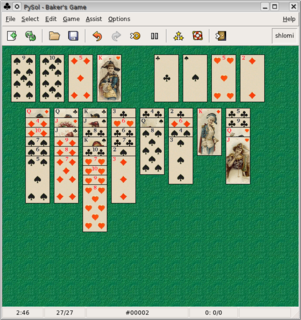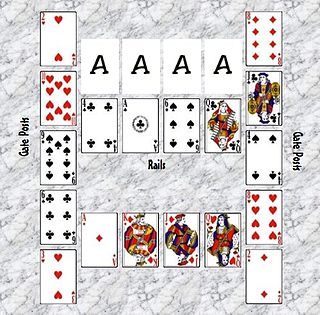Related Research Articles

Games of patience, or (card) solitaires as they are usually called in North America, have their own 'language' of specialised terms such as "building down", "packing", "foundations", "talon" and "tableau". Once learnt they are helpful in describing, succinctly and accurately, how the games are played. Patience games are usually for a single player, although a small number have been designed for two and, in rare cases, three or even four players. They are games of skill or chance or a combination of the two. There are three classes of patience grouped by object.

Klondike, also known as Canfield, is a card game for one player and the best known and most popular version of the patience or solitaire family, something which "defies explanation" as it has one of the lowest rates of success of any such game. Partly because of that, it has spawned numerous variants including Batsford, Easthaven, King Albert, Thumb and Pouch, Somerset or Usk and Whitehead, as well as the American variants of the games, Agnes and Westcliff. The distinguishing feature of all variants is a triangular layout of the tableau, building in ascending sequence and packing in descending order.

FreeCell is a solitaire card game played using the standard 52-card deck. It is fundamentally different from most solitaire games in that very few deals are unsolvable, and all cards are dealt face-up from the very beginning of the game. Although software implementations vary, most versions label the hands with a number.

Calculation is a solitaire card game played with a standard pack of 52 cards. It is part of the Sir Tommy family of patience games. It has its origin in France, where it is known as La Plus Belle.

Baker's Game is a patience or solitaire card game similar to FreeCell. It predates FreeCell, and differs from it only in the fact that sequences are built by suit, instead of by alternate color. This makes the game more difficult to complete successfully.

Spider is a type of patience game, and is one of the more popular two-deck solitaire games. The game originates in 1949, and its name comes from a spider's eight legs, referencing the eight foundation piles that must be filled to win the game.

Pyramid is a patience or solitaire game of the Simple Addition family, where the object is to get all the cards from the pyramid to the foundation.
Perpetual Motion is a Patience game which has the objective of discarding playing cards from the tableau. The name relates to the time-consuming process of the game. It is also called Idiot's Delight or Narcotic.
Gargantua is a patience or solitaire card game that is a version of Klondike using two decks. It is also known as Double Klondike and as Jumbo.

Napoleon at St Helena is a 2-deck patience or solitaire card game for one player. It is quite difficult to win, and luck-of-the-draw is a significant factor. The Emperor Napoleon often played patience during his final exile to the island of St Helena, and this is said to be the version he probably played. Along with its variants, it is one of the most popular two-deck patiences or solitaires. The winning chances have been estimated as 1 in 10 games, with success typically dependent on the player's ability to clear one or more columns. The game is the progenitor of a large family of similar games, mostly with variations designed to make it easier to get out.
Canfield (US) or Demon (UK) is a patience or solitaire card game with a very low probability of winning. It is an English game first called Demon Patience and described as "the best game for one pack that has yet been invented". It was popularised in the United States in the early 20th century as a result of a story that casino owner Richard A. Canfield had turned it into a gambling game, although it may actually have been Klondike and not Demon that was played at his casino. As a result it became known as Canfield in the United States, while continuing to be called Demon Patience in the United Kingdom and elsewhere. It is closely related to Klondike, and is one of the most popular games of its type.
British Square is a patience or solitaire card game which uses two decks of 52 playing cards each. It is a fan-type game in the style of La Belle Lucie. It has an unusual feature of switchback building whereby each foundation is first built up and then built down.
Westcliff is the name of two closely-related patience or card solitaire games of the simple packer type, both of which are played using a deck of 52 playing cards. One version is particularly easy to win, with odds of 9 in 10; the other is harder with odds closer to 1 in 4. The game has a variant, Easthaven.
Gay Gordons is a patience game played with a single deck of playing cards. Gay Gordons is also known under its alternative name Exit, and was invented by David Parlett.

Gate is a solitaire card game played using a deck of 52 playing cards, and is a member of the Canfield family. It gets its name because the cards are laid out in such a way that they form a gate. Average players can expect to win 99% of their games.

Spider Solitaire, also known as Microsoft Spider Solitaire, is a solitaire (NA)/patience (EU) card game that is included in Microsoft Windows. It is a version of Spider. As of 2005, it was the most played game on Windows PCs, surpassing the shorter and less challenging Klondike-based Windows Solitaire.
Algerian or Algerian Patience is a unique and difficult patience or card solitaire using two decks of playing cards. The object of the game is to build 8 foundations down from King to Ace or up from Ace to King in suit.
American Toad is a solitaire game played using two decks of playing cards. This game is similar to Canfield except that the tableau builds down in suit, and a partial tableau stack cannot be moved. The object of the game is to move all cards to the foundations.
Backbone is a unique and difficult solitaire game using two decks of playing cards. The object of this game is to move all cards to the Foundations.
Casket is a moderately easy solitaire game using two decks. The object of the game is to move all of the cards to the foundations.
References
- ↑ Thomas Warfield, The 4 Solitaire Games You Should Win Before You Die, 24 March 2015.
